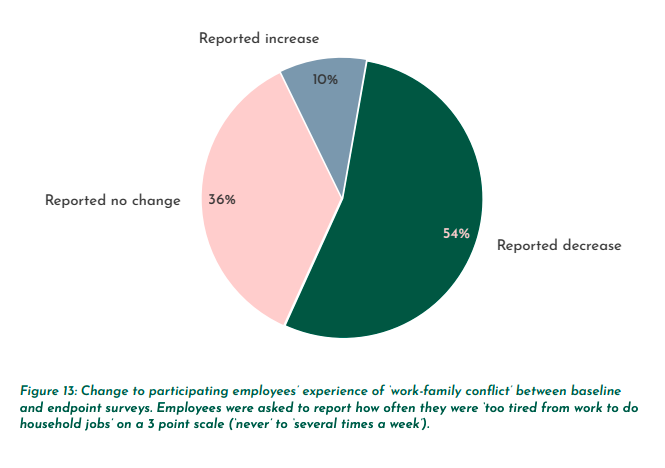Study Finds That Employees Are Less Likely To Quit When Given A 4-Day Work Week
What will you do with an extra day off every week? Play music? Spend time with friends? Do yoga? Paint? Cook? Swim? Visit out-of-town family members? Volunteer at animal shelters? Pick up a new hobby? The possibilities are endless.
"What will you do with an extra day off every week?"
It's the question that thousands of employees at 61 companies that took part in the world's largest four-day work week trial will now have to ponder over after the study found overwhelmingly positive results.
Of the 61 companies in the UK, 56 (92%) said that they will be continuing with the four-day week, with 18 of them confirming that the policy is now a permanent change, in a big win for a better work-life balance.
The study was organised by an advocacy group called 4 Day Week Global, in collaboration with the research group Autonomy, and researchers at Boston College and the University of Cambridge.
Around 2,900 employees took part in the UK-based study, held from June to December 2022, covering different sectors, ranging from non-profits, manufacturers, and finance firms to even fish-and-chip shops.
As per the results of the study released on Tuesday, 21 February, some of the most extensive benefits of shorter working hours were found in the overall improvement in the well-being of the employees.
The majority of the companies agreed that productivity did not suffer and revenues rose 35% on average compared to previous years
"Staff is getting more work done in less time," said Citizens Advice Gateshead chief operating officer Paul Oliver, adding that job retention and recruitment improved while sickness levels went down.
"Before and after" data showed that 39% of employees were less stressed, and 71% had reduced levels of burnout at the end of the six-month trial. Likewise, levels of anxiety, fatigue, and sleep issues decreased.
Employees were also much less likely to quit their jobs as a result of the four-day week policy.
Data also showed positive effects of a four-day week were worth more than their weight in money. 15% of employees said no amount of money would convince them to return to the traditional 5-day work week.
"This is a major breakthrough moment for the movement towards a four-day working week," Joe Ryle, director of the 4 Day Week Campaign, said in a statement to Reuters yesterday.
The study also found that employees experienced an increase in life satisfaction, with men spending much more time with their children
According to the authors of the study, with more free time available, men spent greater time in housework or childcare, thereby narrowing the well-documented gender gap in unpaid domestic and care work.
In the trial, the time men spent looking after children increased by more than double that of women (27% to 13%), but the share of housework between these two genders stayed almost exactly the same.
In general, the employees had an excellent experience with the four-day week trial.
From 0 (very bad) to 10 (very good), the average score was 9.04, the trial found.
When asked whether they would want to continue with the four-day week trial, 90% replied "Yes/Definitely want to continue", with only five people (0.43%) saying that they "somewhat do not want to continue".
However, no one reported that they "definitely do not want to continue".
"It feels like you're easing yourself into the weekend..."
The trial showed that it had significant impacts on people's lives, both inside and outside of work.
While most reported being able to spend more time on the activities they already enjoyed, the four-day work week also allowed some employees to take up entirely new activities, such as using their fifth day to undertake professional qualifications and take day trips with grandparents.
For many, being able to complete essential tasks such as grocery shopping, attending medical appointments, doing household repairs, or cleaning on their fifth day enabled the weekend to become free for genuine leisure and self-initiated activities, as opposed to running errands.
"It feels like you're easing yourself into the weekend... By the time Saturday and Sunday comes, it feels like I've done my [chores]... Whatever it is," said a senior manager of a care services provider.
In conclusion, the trial found that an extra day off every week offers a greater work-life balance for staff, at no additional cost to companies
Companies expressed that they are extremely pleased with employee performance and productivity. It has been a similar case for employees themselves too, the authors of the study noted.
Shorter working hours left employees less stressed and burned out, and it improved their mental and physical health. As a result of the four-day week, many reported that their life satisfaction improved.
The authors also noted that the overwhelmingly positive results from the UK trial, therefore, made it clear that the four-day work week is ready to take the next step from experimentation to implementation.
You can't change things without things changing.
Meanwhile, in Malaysia, Chinese employers now prefer to hire men due to a new policy that gives women extended paid maternity leave:

